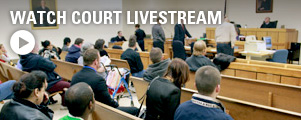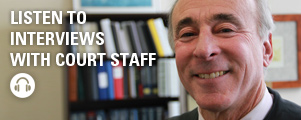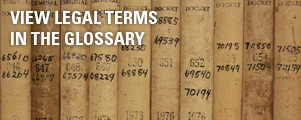Supreme Justice Botsford Rules in Favor of OpenCourt
A justice of the highest court in Massachusetts ruled on Tuesday in favor of allowing OpenCourt to continue its operations beyond Quincy District Court’s First Session courtroom.
“There is no reason to single OpenCourt out and impose on it a variety of restrictions that do not apply to other media organizations,” Supreme Judicial Court Justice Margot Botsford wrote in a 10-page memorandum and judgment issued yesterday, August 14.

Above: SJC Justice Margot Botsford.

Above: The John Adams Courthouse in Boston.
Audio clip: Adobe Flash Player (version 9 or above) is required to play this audio clip. Download the latest version here. You also need to have JavaScript enabled in your browser.
Press play above to stream (or right-click to download) full audio of the four-party hearing before Justice Botsford on August 9th, 2012.
OpenCourt is a pilot project of WBUR, Boston’s NPR news station, designed to apply new approaches to coverage and technology in an effort to cultivate greater transparency in the American justice system. Among other initiatives, OpenCourt has been videostreaming live out of Quincy District Court, one of the busiest district courts in Massachusetts, since May 2011.
Following a a four-party hearing last week, Judge Botsford issued the order in denial of petitions from Norfolk County District Attorney Michael Morrissey as well as the Committee for Public Counsel Services (CPCS), which sought to stymie OpenCourt’s coverage pending an issuance of guidelines for the project from a state-sanctioned media committee.
Leading into this decision, on the heels of a June memo from Quincy District Court First Justice Mark Coven stating OpenCourt coverage of Courtroom A would commence on July 16, both the DA and CPCS had petitioned Norfolk County Superior Court for injunctive relief.
Following a Superior Court hearing before Judge Kenneth Fishman, Judge Fishman denied the plaintffs’ requests, referencing the hypothetical nature of the plaintiffs’ arguments did not seem to merit an order of relief from irreparable harm, and ultimately ruled that the case did not belong in his court’s jurisdiction.
Judge Fishman also witnessed an agreement, however (to which OpenCourt objected), between the plaintiffs and a Special Assistant to the Attorney General’s Office (SAAG) who was representing Quincy District Court Judges: to table coverage of Courtroom A pending a hearing before a justice of the Supreme Judicial Court.
This latest legal process is the second time since OpenCourt’s launch last year that a Justice of the SJC has been asked to decide whether to limit the scope of the project or cease its operation altogether. In March of this year in a ruling on the Commonwealth vs. Barnes case, Judge Botsford wrote on behalf of the full Supreme Judicial Court that OpenCourt could continue operating, and that movements by the state to redact footage legally recorded in a public courtroom would be a violation of First Amendment press protections.
Justice Botsford’s new ruling this week disagrees with the plaintiffs’ notion that operating in Courtroom A amounts to an expansion of the project, and ultimately echoes the sentiment of a portion of the Barnes ruling that OpenCourt may continue to operate under Rule 1:19, Massachusetts’ cameras-in-the-courtroom statute, while the SJC’s Media Judiciary Committee discusses its own guidelines for the project.
“The continuous coverage of jury trials in a different court room in the same court house constitutues part of the same OpenCourt ‘pilot project’ considered in Barnes,” Judge Botsford wrote. “As such, it fits within the provision permitting OpenCourt to continue its operations while formal guidelines are developed.”
Judge Botsford also addressed issues raised in petitions regarding attorney-client conversations.
“Although confidentiality of attorney-client communications is of paramount importance, we stated in Barnes that the fact that OpenCourt derived its audio feed from the same microphones used to create the official court record did not impair a defendant’s right to effective assistance of counsel, because attorneys and defendants must take the same precautions to ensure that they are not overheard as they would if no media were present,” Judge Botsford wrote, continuing:
“Given that OpenCourt’s microphones for its audio feed in Jury Room A will be placed on the room’s side walls rather than directly on the counsel tables, it is even less likely that confidential communications will be picked up. Additionally, the precautions attorneys must take when conversing with their clients would be the same if another media organization chose to record in the court room, and under Rule 1:19, another organization would be entitled to do so.”
View previous blog posts related to this decision:
- Listen to Thursday’s Full SJC Hearing (August 10)
- SJC Hearing Thursday For OpenCourt (August 8)
- District Attorney Moves to Block OpenCourt Media Access (July 25)
Recent news coverage of OpenCourt:
- Opening the courts | BostonHerald.com Editorial, August 18, 2012.
- OpenCourt wins another legal challenge to online streaming in the courtroom | Nieman Journalism Lab, August 14, 2012.
- OUR OPINION: Morrissey Wrong in Effort to Close OpenCourt | The Patriot Ledger, August 2, 2012.
- DA Singles Out OpenCourt in Bid to Censor Coverage | Boston Phoenix 15th Annual Muzzle Awards, July 13, 2012.
Read Judge Botsford’s full August 14 ruling embedded below, or download the PDF. Supreme Judicial Court Justice Rules in Favor of OpenCourt












Compare the lack of access to the decoded stenographic record of the public meeting of Boston City Council. Effective communication is a responsibility of the City Council.